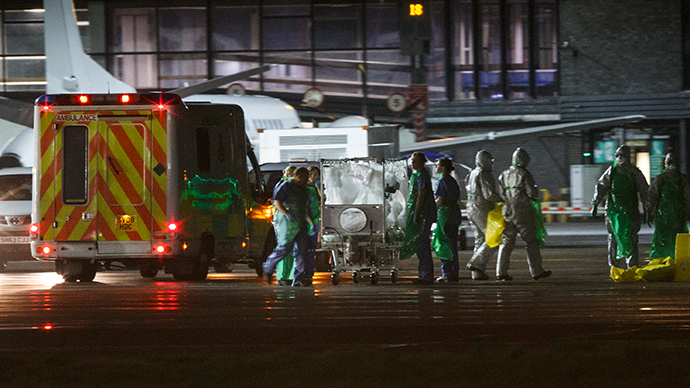
A health worker who was treating patients in Sierra Leone has been diagnosed with Ebola in Scotland, the Scottish government announced Monday, marking the U.K.’s first domestic case of the deadly virus.
The volunteer, who returned Sunday from a treatment facility in Kerry Town in Sierra Leone run by the Save the Children charity, was transferred overnight from a Glasgow hospital in a Royal Air Force plane.
British media named her as Pauline Cafferkey, a nurse who was part of a 30-strong team of medical volunteers sent to Sierra Leone last month.
In an emotional diary written recently for The Scotsman newspaper, Cafferkey talked about her work at the facility, including meeting an orphan boy.
“The sad thing is that this is a regular occurrence and we see and hear of whole families being wiped out by this awful disease,” Cafferkey wrote, describing Ebola as “multifaceted in its destruction.” She also acknowledged the risks of the work, writing:
“The area where the Ebola patients are is classed as the infective Red Zone, and the area surrounding it, the safe Green Zone. Bizarrely we find ourselves saying ‘good luck’ to our colleagues prior to entering the Red Zone, a sobering reminder of what we are doing.”
U.K.’s first Ebola diagnosis
This is the first time someone has tested positive for Ebola in Britain, and Cafferkey will be the second patient ever treated for the virus in the country after fellow nurse William Pooley, who made a full recovery earlier this year and has since returned to Sierra Leone.

Officials say Cafferkey flew to Scotland from Sierra Leone on Sunday, the day before she was diagnosed with Ebola.
The world’s deadliest-ever outbreak, which has killed 7,842 people out of 20,081 cases, has been centered on Sierra Leone, Liberia and Guinea in West Africa.
In October, a Spanish nurse who treated two Ebola-infected Spanish missionaries became the first person to be diagnosed with the disease in Europe and the first to contract it outside of Africa. Since then, isolated cases have also been reported in the U.S.
Around 200 people have been tested for Ebola in hospitals across England this year, with all of them testing negative so far.
A second person returning from the affected region is being tested for the virus in Cornwall in southwest England and a third, also a healthcare worker, was to be tested in Aberdeen, Scotland. Officials said that as far as they knew neither of the two had contact with the confirmed case and the test results were expected later on Tuesday.
Case poses ‘extremely low’ risk to the public
The new case is being treated at the Royal Free Hospital in London, which has a high-level isolation unit ready to handle Ebola cases and equipped with its own ventilation system to avoid contagion. According to the Guardian, doctors have said the nurse is in stable condition, “showing few signs causing clinical concern.”

Pictured above is a High Level Isolation Unit at the Royal Free Hospital, where the U.K.’s first Ebola case is being treated.
Cafferkey had traveled to Glasgow from Sierra Leone on Sunday, via Casablanca in Morocco. Health authorities said they had contacted almost all of the 70 people who were on the plane with her on the last leg of her journey from London Heathrow Airport to Glasgow. However, the risk to other passengers was described as “extremely low“.
The National Health Service worker was admitted to a hospital in Glasgow on Monday after feeling feverish. Doctors diagnosed her with Ebola later that day.
Health officials stressed that the nurse was “diagnosed in the very early stages of the illness” and that the risk of transmission to others was “extremely low.”
“This is not a disease you can contract by simply sitting next to somebody who has it,” said Scottish First Minister Nicola Sturgeon. “Contact, personal contact with bodily fluids, is required. This patient was not displaying the kind of symptoms that would have posed a risk to other people when she was en route back to Scotland, and that, I think, is the principle source of reassurance we can give.”
